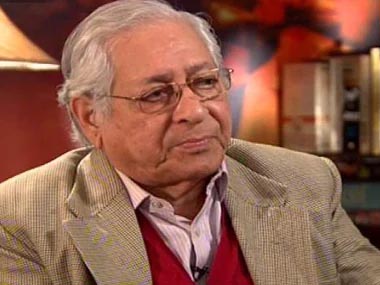NE NEWS SERVICE
NEW DELHI, APR 30
Distinguished jurist and former Attorney General Soli Sorabjee, who appeared in several historic cases like Kesavananda Bharti and S R Bommai, passed away due to COVID-19 at a hospital here on Friday.
The 91-year-old is survived by wife, a daughter and two sons.
A recipient of the Padma Vibhushan, the second highest civilian award of the country, the renowned human rights lawyer served as the Attorney General for India from 1989-90 and then from 1998-2004 during the tenure of V P Singh and Atal Bihari Vajpayee respectively.
President Ram Nath Kovind, Vice President Venkaiah Naidu and Prime Minister Narendra Modi were among a host of leaders who condoled the passing away of the eminent jurist.
The prime minister described him as an outstanding lawyer who was at the forefront of helping the poor and downtrodden through law.
Chief Justice of India (CJI) N V Ramana also condoled the demise of Sorabjee.
“I am deeply saddened to learn about the passing of Shri Soli Jehangir Sorabjee, former Attorney General of India. In his nearly 68 year long association with the judicial world, he made immeasurable contribution in enriching the global jurisprudence of Human Rights and Fundamental Right,” he said.
Considered one of the best Constitutional law experts, Sorabjee wrote several books on laws and justice, press censorship and the Emergency, and vehemently fought against human and fundamental rights violations.
One of his recent court battles pertaining to fundamental right violations was the Shreya Singhal case in which the Supreme Court in 2015 agreed to his submissions and struck down a provision in the Information Technology Act relating to restrictions on online freedom of speech and expression.
The top court held that section 66A was unconstitutional as being violative of freedom of speech guaranteed under the Constitution, the point put forth by Sorabjee,
Considered close to Vajpayee, Sorabjee had led India’s fight in the International Court of Justice (ICJ) when Pakistan sought compensation from India for downing of their naval patrol aircraft Atlantic in 1999 just after the Kargil war.
The ICJ at the Hague ruled in India’s favour after taking note of submissions of Sorabjee and dismissed Pakistan’s claim for compensation, saying it had no jurisdiction over the matter.
He also appeared and worked for the Citizen’s Justice Committee which represented anti-Sikh riots victims.
Born in a Parsi family in 1930, Sorabjee enrolled at the bar in 1953 and was designated senior advocate by the Bombay High Court in 1971.
Sorabjee appeared in many important cases including the Kesavananda Bharati matter on basic structure doctrine and the S R Bommai matter relating to invocation of President’s rule in states among others.
He was appointed by the United Nation’s as a Special Rapporteur for Nigeria in 1997 to report on the human rights situation in that country and later became a member and the Chairman of the UN-Sub Commission on the Promotion and Protection of Human Rights, from 1998 to 2004.
Sorabjee was also a member of the United Nations Sub-Commission on Prevention of Discrimination and Protection of Minorities since 1998.
He has also served as member of the Permanent Court of Arbitration at the Hague from 2000 to 2006.
Sorabjee, who hardly filed any PIL on his own, was so overwhelmed by the terror strike in Mumbai in 2008 that he himself filed a public interest litigation in the top court seeking direction for training and equipping police force to tackle terrorists.
Sorabjee was champion of freedom of press, committed to democratic value: CJI Ramana
Chief Justice N V Ramana Friday condoled the passing away of eminent jurist and former attorney general Soli Sorabjee saying he had “deep commitment to democratic values” and was a champion of “freedom of press”.
The CJI, in a statement, expressed shock over the demise of the legal luminary and said, “In his nearly 68 year long association with the judicial world, he made immeasurable contribution in enriching the global jurisprudence of Human Rights and Fundamental Rights.”
Justice Ramana said the matters Sorabjee had argued before the courts, the judgments he could secure as well as “the books, essays, papers of international repute and the newspaper articles that he had authored; the independent opinions he could tender to the Government in his capacity as the Attorney General – they all stand testimony to his deep commitment to democratic values”.
Sorabjee not only lived up to the mandate of Attorney General as enshrined in the Constitution but also raised the bar in discharge of his constitutional duties, the CJI said.
“Being a champion of ”Freedom of Press”, he effectively used the media as a platform to elucidate the nuances of complicated legal issues on almost daily basis till recently, literally giving lessons of law to millions of common people who otherwise could not have followed what was happening in the judicial world. His ability to adapt to the new trends in media was remarkable,” he said.
The CJI further said that he personally gained immensely from reading Sorabjee’s literary works, listening to his lectures and arguments and his “sagacious guidance and advise”.
“His humane and compassionate approach defined his legal work. He will be remembered as a legend who added strength to the pillars of democracy. I pay my humble tributes to the departed soul. I convey heartfelt condolences to the family, friends and countless fans of Shri Soli Sorabjee, on my own behalf and on behalf of the Supreme Court of India where he will continue to command respect forever,” the CJI said in the statement.












